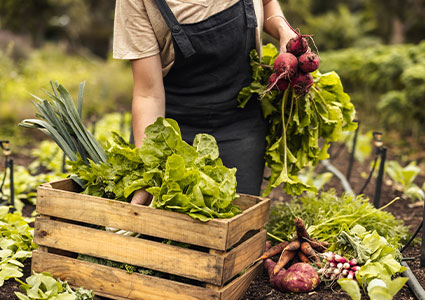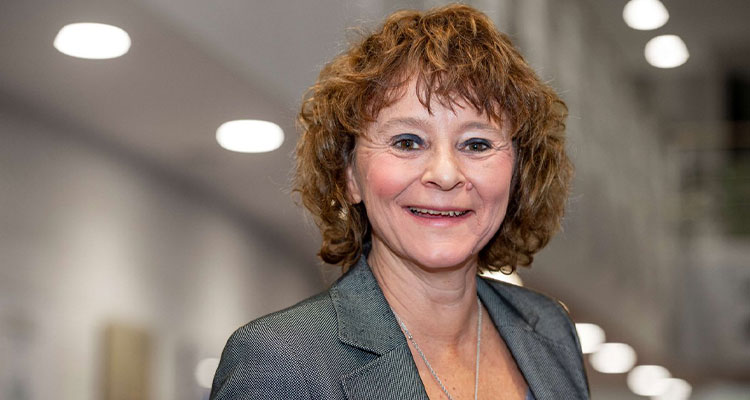Professor Roberta Sonnino champions collaboration as the key to making food systems more sustainable
I joined the University of Surrey a little over two years ago as Professor of Sustainable Food Systems. My first 19 years in the UK were spent at Cardiff University where I directed the Research Centre for Sustainable Urban and Regional Food in the School of Geography and Planning. Prior to that, I was in the States doing a PhD in anthropology on a Fulbright scholarship. I consider myself a political geographer of food, have over 100 publications to my name and have dedicated my whole career to this topic,” Professor Roberta Sonnino begins.
“A sustainable food system delivers on three fronts: environmental, social and economic. It’s a system that fosters economic equity, is socially inclusive and environmentally benign. As is evident in everyday life, we are far from achieving the vision of a sustainable food system. There are millions of people living in food poverty in the UK alone. As such, it’s become crucially urgent to transform the food system and the convoluted way in which it works to instead create a system that delivers its primary function of feeding all people good and healthy food. Currently, this is a privilege for the few and not the right of everybody. So, this is what a lot of my research is about, the policies, governance, and context required to ensure that the food system becomes sustainable and feeds everybody healthy food.
“One of the most astounding things I have witnessed in my 20 years in this field is the activity that emerges at a local level and not just civil society led initiatives, but also the sterling work by municipal authorities in the UK and elsewhere. I’ve also seen a lot of activities and initiatives at a global level, where organizations such as the European Commission and the Food and Agriculture Organization (FAO) of the UN have tried to engage with this grand challenge of food system transformation. Unfortunately, though, we then see nothing in between, and national governments remain completely silent on this important issue. It’s a genuine concern that we don’t have a coherent governance context. Why don’t we have a Minister of Food, a national food policy? How can food not be a policy priority?
 “In my work,” she elaborates, “I talk about policy integration and the importance of turning food into a policy agenda for governments at different levels. We need a concerted effort, as no single body is going to transform the food system alone. We need the private sector, the public sector, civil society, and policy makers working together and operating at local, regional, national, and global levels. It’s a challenge that can still be met, but not through isolated efforts. There are numerous enlightened individuals, fantastic civil society led initiatives, and great work being carried out by NGOs, but there is no funding. There are no strategies in place to try and scale up what they’re doing nor establish connections between what’s already there. Citizens have been trying to feed themselves healthily and to connect their communities around food for some time. So, at the very least, practitioners need to see what currently exists and if something can be done to establish connections. Food banks, for example, traditionally provide canned goods but I came across an initiative in Wales that worked to connect food banks with local allotments and community gardens. While this isn’t revolutionary, it’s a step in the right direction to establishing connections rather than vicious cycles in the food system.
“In my work,” she elaborates, “I talk about policy integration and the importance of turning food into a policy agenda for governments at different levels. We need a concerted effort, as no single body is going to transform the food system alone. We need the private sector, the public sector, civil society, and policy makers working together and operating at local, regional, national, and global levels. It’s a challenge that can still be met, but not through isolated efforts. There are numerous enlightened individuals, fantastic civil society led initiatives, and great work being carried out by NGOs, but there is no funding. There are no strategies in place to try and scale up what they’re doing nor establish connections between what’s already there. Citizens have been trying to feed themselves healthily and to connect their communities around food for some time. So, at the very least, practitioners need to see what currently exists and if something can be done to establish connections. Food banks, for example, traditionally provide canned goods but I came across an initiative in Wales that worked to connect food banks with local allotments and community gardens. While this isn’t revolutionary, it’s a step in the right direction to establishing connections rather than vicious cycles in the food system.
“From solidarity purchasing groups to community fridges, there are many examples of the positive ways in which people are helping to feed themselves and others. A community fridge is one example of a system that helps to mitigate environmental impacts while feeding struggling citizens. Likewise, in the realm of public food procurement, there are many fragmented examples of best practice. I worked on a marvelous example of localization of the school food system in Scotland. There were clear benefits associated with ensuring that schools were sourcing local food, one of which was notably the reduction in food miles by 70 percent. This is an example of one of the first reform initiatives. It occurred approximately 20 years ago and had a multiplying effect of generating £160,000 for the local economy. By sourcing healthy local food, income and employment were generated for the local community. There are also examples of numerous civil led initiatives that have helped us overcome moments of crisis, such as when the Covid pandemic hit.
“Cities are also positioning themselves at the forefront of the sustainability challenge. The London Food Board (LFB), for example, has launched integrated food strategies to try and help citizens access healthy food. LFB consists of 13 individuals who advise the Mayor of London and the GLA on food matters that affect Londoners. It’s one of the earliest governance mechanisms created to achieve food policy integration. We need to build on these examples of good practice and create synergies between them, because this is what food system transformation is all about.
“In my opinion, businesses have often been primarily responsible for a lot of the existing problems, and in particular, the creation of food environments in our cities that do not enable healthy eating practices. That said, the private sector will tend to go wherever demand goes. The most sustainable food system I’ve witnessed was the school food system created in the city of Rome many years ago. I suggested steps that could be taken to improve it and proposed the guaranteed freshness award criterion to enable local food sourcing. Interestingly, Sodexo won the contract, so this is a perfect example of the fact that the private sector is ready, willing and able to collaborate. There is obviously something in it for a private company in terms of profit and visibility, but many organizations are genuinely becoming more committed to the challenge of sustainable development. When I started my research 20 years ago, we talked about alternative food networks; food chains that were driven by quality rather than quantity and profit. Today, we no longer talk about alternative food networks. We have realized that this is part of a much larger and more complex system, and the urgency of food system transformation is finally on the agenda. It’s beginning to enter the domain of policy and we need to make the most of this momentum.
“Policies ensure that the private sector is unable to operate exclusively based on profit. Legislation and regulation ensure that profit is combined with other considerations that are in the public interest. Food is a public concern, and it should remain as such. Although local produce can reduce food miles, we can’t feed the world exclusively by means of local initiatives, and distance is only one indicator of the environmental implications of food production. If food is highly processed for example, it doesn’t matter where it comes from, it’s still going to produce significant greenhouse gas emissions,” she explains.
In her career, Roberta has secured £28 million of research and innovation funds to support her international research on sustainable food systems, which has a particular focus on governance and urban food systems. She has an established track record of creating impact and engagement at the interface of food systems research and policy. In 2019, she was invited by UN FAO to assemble and lead a research team tasked with drafting their first Framework for the Urban Food Agenda with a focus on a multi-sectorial, multi-stakeholder and multi-level approach to food insecurity and malnutrition across the rural-urban continuum.
“It’s fantastic for me to see cities and local authorities around the world wanting to use the framework to transform food systems, but there’s still a lot of work to be done. The research that’s been done so far has only captured the most formalized expressions of the food movement, but my research is beginning to show that it’s a far more diverse global movement in terms of levels of formality, composition, representation, and engagement. There are partnerships, coalitions, and councils, but also food advisory groups. We need to capture that diversity and make the most of it, because they all have a vital role to play in terms of transforming the food system. For me, it’s important to continue doing research that directly or indirectly presses national governments to do their job. While more than 100 governments committed themselves to food system transformation after the Food Systems Summit, I’m not seeing much action. I want to know what type of evidence they want from us that will convince them to design and deliver sustainable food policies.
“During the pandemic, the monstrous consequences of this inertia were visible to everybody. We all saw the juxtaposing images of produce left to rot in fields because migrant labourers couldn’t travel, alongside empty supermarket shelves and longer and longer queues of citizens at food banks. What is particularly frustrating is the tendency of certain national governments to dump the problem on the third sector. We survived because of all the work that NGOs, like Sustain, did at the time to find solutions for the most vulnerable and marginalized citizens. As I’ve said, this needs to be a concerted effort. No one should think, either as a private citizen or a stakeholder group, that the problem is going to be solved by someone else. We all need to do our part individually and collectively,” she asserts.
surrey.ac.uk/people/roberta-sonnino
